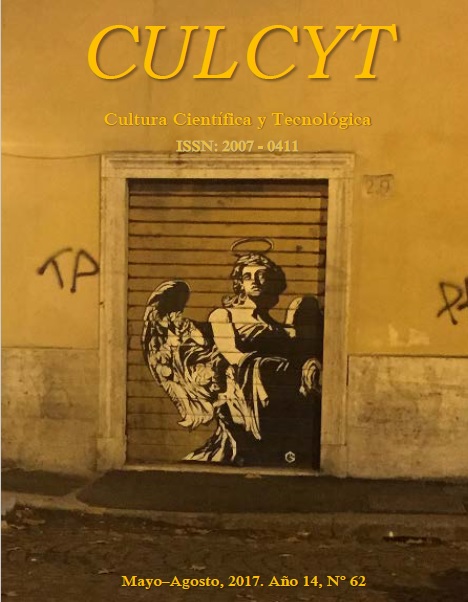LOS MEDIOS SOCIALES COMO TEMA DE INVESTIGACIÓN DE TESIS DE POSGRADO
Palabras clave:
Medios sociales, Tema de tesis, Investigación de tesis, Tesis, Maestría, DoctoradoResumen
Los medios sociales como Facebook, Twitter, blogs, YouTube, Instagram, Pinterest, Tumblr, Snapchat, Flickr y otros muchos más, por su uso e impacto en todos los aspectos de la vida de la sociedad, están llamando la atención de los estudiantes de posgrado que ven en ellos una fuente inagotable de temas de investigación de tesis para cualquier disciplina. Se analizan diferentes temas y enfoques utilizados por estudiantes de posgrado para el desarrollo de sus tesis de maestría y doctorado, y razones que se aducen para la selección de sus temas. Se presentan los temas más frecuentes de investigaciones doctorales relacionadas con los medios sociales.Descargas
Citas
Acar, A. 2013. Culture and Social Media. Doctoral Dissertation. Japan: Kobe City University
Acar, A. 2014. Culture and Social Media: An Elementary Textbook. UK: Cambridge Scholars Publishing
Alshareef, MA. 2017. How Facebook is being used in Saudi Arabia as a news source. Master Thesis. USA: Arkansas State University
Altenbach, C. 2016. Social Media in the Classroom. Master Thesis. USA: State University of New York
Anderson, JQ; JL Boyles & L Rainie. 2012. The future impact of the Internet on higher education: Experts expect more-efficient collaborative environments and new grading schemes; they worry about massive online courses, the shift away from on-campus life. USA: Pew Research Center’s Internet & America Life Project
Auxier, BE. 2012. Social media instruction in journalism and mass communications higher education. Master Thesis. USA: University of Maryland
Axinia, E. 2011. What is the future of employer branding through social media: A Delphi Study among academics. Master Thesis. The Netherlands: University of Twente
Barbier, L. 2013. In a Cabinet at Harvard: The Remains of Nabokov’s Butterfly Obsession. Atlas Obscura http://bit.ly/2wvOVyW
Benedict, LP. 2014. A critical synthesis and thematic analysis of the use of social media in higher education marketing. Doctoral Dissertation. USA: Tarleton State University
Bilsing, DK. 2015. Social media in study abroad. Master Thesis. USA: Iowa State University
Coffin, T & J Fournier. 2015. Social Media in the Learning Setting: Opportunities and Challenges. Information Technology. University of Washington
Chauhan, K. 2017. Social Media Use at Work. Doctoral Dissertation. USA: University of Texas at Arlington
Chapman, K. 2016. Digital Activism. How Social Media Prevalence has Impacted Modern Activism. Master Thesis. USA: University of Washington
Chulis, K. 2016. Data mining Twitter for cancer, diabetes, and asthma insights. Doctoral Dissertation. USA: Purdue University
Evans, TZ. 2017. Twitter in the Higher Education Classroom: Exploring Perceptions of Engagement. Doctoral Dissertation. USA: Robert Morris University
Feeney, S& NK Freeman. 2015. Smartphones and social media - ethical implications for educators. YC Young Children, 70(1), 98
Golder, S & M Macy. 2012. Social Science with Social Media. ASA Footnotes. Vol. 40, No 1
Hall, SJ. 2014. How Higher Education Institutions Utilize Social Media. Master Thesis. USA: Georgia Southern University
Holder-Ellis, M. 2015. The Role of Social Media Technology Tools in Higher Education Instruction. Doctoral Dissertation. USA: Walden University
Holmes, AL. 2016. Social Media: Are There Differences Between First Responders and Citizens Contributing to Emergency
Management Responsiveness Using Social Media? Doctoral Dissertation. USA: St. Thomas University
Hong, YJ. 2014. Framing Citizen Journalism in Mainstream News Coverage. A Quantitative and Qualitative Analysis (1999-2012). Doctoral Dissertation. USA: The University of Minnesota
Hughes, B. 2017. How social media is reshaping today’s education system. Entrepreneur http://bit.ly/2v9arWf
Johnson, JW. 2013. A comparison study of the use of paper versus digital textbooks by undergraduate students. Doctoral Dissertation. USA: Indiana State University
Levin , I & A Kojukhov. 2013. Personalization of learning environments in post-industrial class. M. Patrut & B. Patrut eds. “Social Media in Higher Education: Teaching in web 2.0”. USA: Information Science Reference Pub.
Lowe, REM. 2016. Education all a'Twitter: Twitter's role in educational technology. Doctoral Dissertation. USA: Marshall University
MacRae, IJ. 2008. Butterfly Chronicles: Imagination and Desire in Natural & Literary Histories. Canadian Journal of Environmental Education. Vol. 13, No 2
Magid, L. 2017. Hurricane Harvey: Social media and mobile tech come to the rescue in Texas. The Mercury News. 31/VIII/2017. http://bayareane.ws/2wY9CED
May, T. 2015. Social Media: A Study of its Use in Higher Education. Doctoral Dissertation. USA: Grand Canyon University
Nurmis, JM. 2017. Can Photojournalism Enhance Public Engagement with Climate Change? Doctoral Dissertation. USA: University of Maryland
O'Hallarn, B. 2016. Sport, Twitter hashtags and the public sphere. Doctoral Dissertation. USA: Old Dominion University
Paulsen, M & J Taekke. 2013. Social Media and Teaching: Education in the new media environment. 40th anniversary Nordmedia conference: Defending democracy. Oslo and Akershus University College
Piotrowski, Ch. 2015. Social Media: Major topics in dissertation research. Education: Vol. 135, Num. 3
Roberts, CM. 2010. The Dissertation Journey: A Practical and Comprehensive Guide to Planning, Writing, and Defending Your Dissertation. USA: Corwin, A SAGE Company
Silva, C. 2017. Social media's impact on self-esteem. Huffington Post. http://bit.ly/2eEiEid
Singla, ML & A Durga.2015. How Social Media Gives You Competitive Advantage. Indian Journal of Science and Technology, Vol. 8 (S4)
Wolfe, L. 2013. Technology and romantic relationships. The impact of Facebook. Doctoral Dissertation. USA: Palo Alto California
Wong, Q. 2017. Twitter says tweeting about Harvey eclipses these major U.S. events. The Mercury News. 30/VIII/2017. http://bayareane.ws/2vRoFuq
Zgheib, G. 2014. Social Media Use in Higher Education: An Exploratory Multiple-Case Study. Doctoral Dissertation. USA: George Mason University
Publicado
Cómo citar
Número
Sección
Licencia
Todos los contenidos de CULCYT se distribuyen bajo una licencia de uso y distribución “Creative Commons Reconocimiento-No Comercial 4.0 Internacional” (CC-BY-NC). Puede consultar desde aquí la versión informativa de la licencia.
Los autores/as que soliciten publicar en esta revista, aceptan los términos siguientes: a) los/las autores/as conservarán sus derechos de autor y garantizarán a la revista el derecho de primera publicación de su obra; y b) se permite y recomienda a los/las autores/as agregar enlaces de sus artículos en CULCYT en la página web de su institución o en la personal, debido a que ello puede generar intercambios interesantes y aumentar las citas de su obra publicada.



